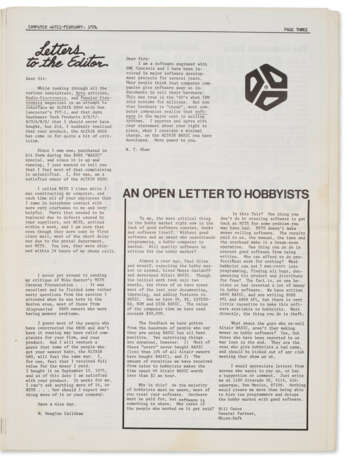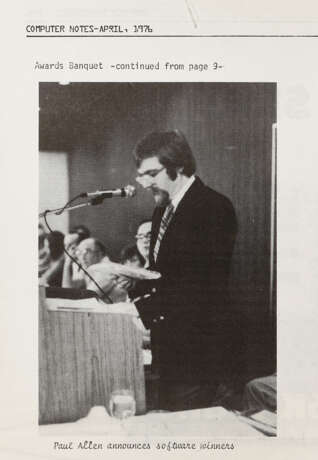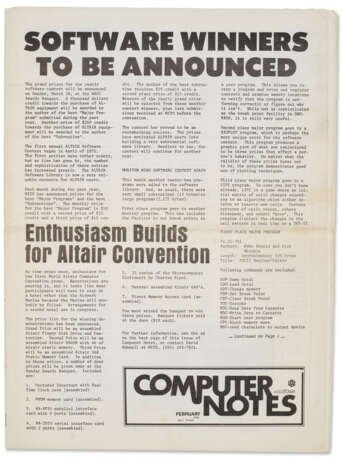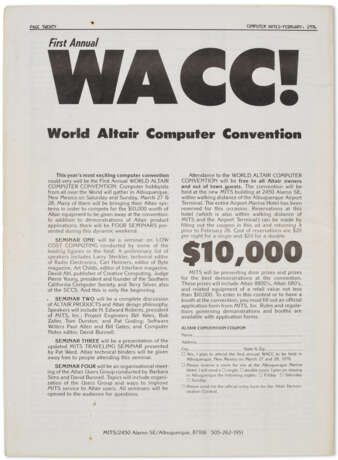COMPUTER NOTES, INCLUDING BILL GATES’ FAMED “AN OPEN LETTER TO HOBBYISTS”
10.09.2024 00:00UTC +00:00
Classic
Verkauft
6930USD $ 6 930
| Auctioneer | CHRISTIE'S |
|---|---|
| Veranstaltungsort | Vereinigtes Königreich, London |
| Aufgeld | see on Website% |
Archiv
Die Auktion ist abgeschlossen. Es können keine Gebote mehr abgegeben werden.

ID 1279139
Los 8 | COMPUTER NOTES, INCLUDING BILL GATES’ FAMED “AN OPEN LETTER TO HOBBYISTS”
Schätzwert
$ 5 000 – 8 000
SEPTEMBER 1975 – NOVEMBER 1976
Eight early issues of Computer Notes (vol. 1, issues 4, 9-12; and vol. 2, issues 3, 5, 6)
“As a majority of hobbyists must be aware, most of you steal your software. Hardware must be paid for, but software is something to share. Who cares if the people who worked on it get paid?”
Bill Gates’ seminal defense of software engineers’ proprietary work.
A series of eight early issues of Computer Notes is not only a rarity, but a valuable guide to the conversations that Gates was disrupting when he wrote his “Open Letter to Hobbyists” at the start of 1976. The front-page headline for the very issue containing Gates’ letter flags when the winners of the annual Altair Software Contest will be announced, noting how “[t]he prizes have motivated ALTAIR users into building a very substantial software library” and underscoring the present concern for finding ways to motivate engineers in the time before Gates’ remapping of the software market. Commenting one page later on the effort and expense that he, Paul Allen and Monte Davidoff poured into producing high-quality software and the widespread popularity of Altair BASIC, Gates pins the lack of reward for their labors on a commonly-accepted fact in the tech community at the time: “As a majority of hobbyists must be aware, most of you steal your software. Hardware must be paid for, but software is something to share. Who cares if the people who worked on it get paid?” Though his reproach proved controversial in certain circles (leading to “A Second and Final Letter” from Gates in Computer Notes two months later), Gates was resolute in motivating talented engineers to dedicate their time and effort towards improving tech’s functionality and user experience by correcting their own misalignment with the business models driving the exponential technological progress of the twentieth century. Gates’ intervention, signaled by “An Open Letter to the Hobbyists,” began the paradigm shift needed to inspire the massive investments into software that we see today and realize the previously unimaginable things that computers can accomplish.
The open letter was circulated concurrently by the Homebrew Computer Club and the Micro-8 Computer User Group, but it found a particularly sympathetic ear in Computer Notes’s David Burnell, who was among this first tranche of editors to distribute the letter in January 1976 (for the February issue).Burnell himself in September 1975 had questioned why the code that developers write and its piracy are not treated like the theft of works by musicians or authors. “Are people who copy software any different than those who copy records and books?” Burnell asks in the earliest issue of Computer Notes present in this collection, presaging Gates’ letter by several months.
The collection also includes Gates’ follow-up article, “A Second and Final Letter” (April 1976), as well as articles by Paul Allen and images of him at hobbyist events. Hobbyist computer periodicals are rare to survive especially in such excellent condition, as such this collection of Computer Notes is an important record of the early years of personal computing and a tribute to the pioneers of software development, with Gates and Allen right there in its pages.
15 ½ x 11 ¼ in. (39.4 x 28.6 cm.)
| Kategorie des Auktionshauses: | Medizin und Wissenschaft, Bücher und Handschriften, Gedruckte Bücher |
|---|
| Kategorie des Auktionshauses: | Medizin und Wissenschaft, Bücher und Handschriften, Gedruckte Bücher |
|---|
| Adresse der Versteigerung |
CHRISTIE'S 8 King Street, St. James's SW1Y 6QT London Vereinigtes Königreich | |
|---|---|---|
| Vorschau |
| |
| Telefon | +44 (0)20 7839 9060 | |
| Aufgeld | see on Website | |
| Nutzungsbedingungen | Nutzungsbedingungen |





